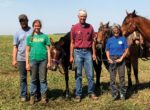Advertise Follow Us
Items Tagged with 'Dwayne beck'
ARTICLES
[Podcast] Fixing Broken Ecosystem Cycles with Dwayne Beck
[Podcast] Revisiting Dwayne Beck on Crop Rotations Part 2
Dakota Lakes Research Farm Hiring New Manager
Securing Stability Through Stacked Enterprises and Stockpiled Carbon
Leveling Up and Paring Down for Better No-Till Results
No-Till, Along with Longer Rotations, Makes for Great Grazing and Improving Soils
A Story Worth Telling
[Podcast] The Shoulders on Which We Stand ... The Living Legends of No-Till History
PRODUCTS
Beating Weeds, Diseases and Insects with Diverse No-Till Rotations - Dwayne Beck - NNTC 2016 Presentation - MP3 Download
Weeds, diseases and insects are nature’s way of adding diversity to a system that lacks it. You can try to find technologies that can control all the problems that pop up, or you can prevent most of them by providing beneficial diversity of your own. Dwayne Beck explains why no-tillers will want to rediscover rotational techniques for managing pests, especially with current cost/price ratios. The director of the Dakota Lakes Research Farm near Pierre, S.D., shares why crop rotations that are consistent in sequence or interval provide opportunity for weeds and insects. He also discusses the strengths and weaknesses of different types of rotation.
ViewThe Need for Transformation in Your No-Till System - Dwayne Beck - NNTC 2016 Presentation - MP3 Download
Almost all change in agriculture is and has been incremental. For the most part, no-till systems differ little from conventional systems. If we’re going to solve the environmental issues and energy issues we face, we must take a different approach. Dwayne Beck discusses how we can do things differently to solve these problems, specifically with crop rotation. The director of the Dakota Lakes Research Farm in Pierre, S.D., shares how crop rotation is more complex than simply adding wheat or cover crops. He talks about how to look at your system and find the things that let you avoid many of the problems that are now costing you lots of money and a loss of productivity.
View









